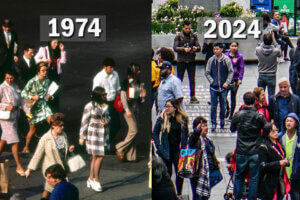West Long Branch, NJ – Two-thirds of Americans believe that there is a special person out there who they are meant to be with according to the national Monmouth University Poll . Despite the old adage that opposites attract, though, most Americans feel that their ideal mate is someone who is basically similar to themselves – and for most people that means a level-headed decision-maker who will be their best friend.
About two-thirds of American adults believe in the concept of soulmates – the idea that there is a specific person you are meant to be with – including 35% who believe this a great deal and 31% who believe it somewhat. Another 14% say they do not give much credence to the idea of soulmates and 17% do not believe in the concept at all. Women who are currently in a relationship (82%) are the most likely to believe in the idea of soulmates. A smaller majority of men in a relationship (64%) feel the same. Among adults who are not currently in a relationship, just over half of women (53%) and just under half of men (47%) say they believe in the idea of soulmates.
“Though romantic, believing in soulmates isn’t necessarily ideal for your relationship,” said Dr. Gary Lewandowski, professor and chair of psychology at Monmouth University whose research focuses on romantic relationships. “The research indicates that those who believe in soulmates and destiny, are actually more likely to break up. On the other hand, those who believe that relationships grow over time have more stable relationships and are better at dealing with conflict.”
The survey also found that a like-minded person is more likely to be seen as the ideal mate rather than someone who can serve to “balance out” one’s personality. Six-in-ten Americans say that partners should generally be similar compared with 1-in-3 who say they should be more different, although they shouldn’t be too similar or indeed too different. Specifically, just 9% say that partners in an ideal relationship should be very similar while 52% say they should be somewhat similar. Likely, just 3% say partners should be very different while 29% say that somewhat different partners make an ideal match. There is very little difference in this opinion by gender, age, or current relationship status.
“Here the respondents got it right. Being more similar helps minimize conflict. If both of us like going to the beach, neither of us need to sacrifice,” said Dr. Lewandowski.
In fact, the vast majority (83%) of American adults currently in a relationship report they see their current partner as their best friend, including 88% of those who are married and 72% in a non-marital relationship.
Dr. Lewandowski stated, “Considering your romantic partner to be your best friend is an important component of quality relationships. In fact, when researchers asked couple who have been married over 15 years why their relationship lasted, the top reason was that their partner is their best friend.”
Despite the popular image of being smitten with Cupid’s arrow, most Americans say their ideal partner is someone who generally makes decisions with their head (78%) rather than their gut (15%). This corresponds with how Americans tend to see themselves as well; most say they themselves are cool-headed decision makers (66%) rather than being driven by gut instinct (26%). There are no significant gender or age differences in these findings.
Among those who say they use their head to make decisions, 89% prefer a partner who is similarly inclined and just 9% want a partner who tends to make more decisions with their gut. Among those who describe themselves as gut-level deciders, just 30% prefer to be partnered with another gut-level person. The vast majority (66%) would actually rather have a partner who makes decisions more with their head.
According to Dr. Lewandowski, “Emotionally unstable partners undermine relationships, so having a partner who is more logical and rational should promote stability.”
There could also be some disappointment when potential partners are trying to match up on brain power, with nearly 4-in-10 Americans looking for a partner who is their intellectual superior and very few seeking out someone who ranks lower in the IQ department. About half (51%) of all Americans say the ideal person to marry is someone who is equally as smart as they are. Another 39%, though, say it is better to marry someone smarter than oneself while just 3% say it is a good idea to marry someone less smart. Among those who are currently in a relationship, men (42%) are somewhat more likely than women (34%) to say someone smarter than themselves makes the ideal marriage partner.
“Marrying someone smarter than you is wise, because in quality relationships you take on many of your partner’s qualities as your own, and ultimately share your partner’s successes,” Dr. Lewandowski said. “Intelligent partners simply have more to offer you.”
About 7-in-10 American adults are currently in a relationship and nearly all of this group report being satisfied with their current partnership – including 57% who are extremely satisfied and 31% who are very satisfied. Relationship satisfaction levels are basically unchanged from a poll taken just over two years ago.
Women (58%) and men (57%) are equally as likely to be extremely satisfied in their current relationship. In the prior poll, 61% of women and 54% of men reported being extremely satisfied. Partnered adults under the age of 35 (64%) and between age 35 and 54 (60%) are somewhat more likely than those age 55 and older (48%) to be extremely satisfied. This marks a 10 percentage point increase in extreme satisfaction among those age 18 to 34 and a 9 point decrease among those age 55 and older. These changes are due more to shifts among men rather than women in those age groups – i.e. greater increased satisfaction among younger men and decreased satisfaction among older men. The percentage of those age 35 to 54 who are extremely satisfied in their current relationship is identical to the prior survey.
The poll also found that the partisan divide impacting so many areas of American life has also crept into how we view our relationships. Self-described Republicans (65%) are more likely than independents (57%) and Democrats (52%) to say they are extremely satisfied with their current relationship. Also, Republicans (91%) are somewhat more likely than independents (78%) and Democrats (83%) to say their partner is their best friend. These partisan differences hold regardless of gender or age.
“These differences may be attributable to Republican’s placing greater value on marriage. As a result, Republicans may be more motivated to see relationships more positively,” said Dr. Lewandowski.
The Monmouth University Poll was conducted by telephone from January 12 to 15, 2017 with 801 adults in the United States, including 50% who are married, 10% who are living with a partner, and another 10% who are in a non-cohabitating romantic relationship. The results in this release have a margin of error of +/- 3.5 percent. The poll was conducted by the Monmouth University Polling Institute in West Long Branch, NJ.
QUESTIONS AND RESULTS
(* Some columns may not add to 100% due to rounding.)
[Q.1-26 previously released.]
27. Which of the following best describes you: married, living with a partner, never been married, widowed, divorced, or separated? [If NEVER MARRIED/WIDOWED/DIVORCED: Are you currently in a romantic relationship with someone?]
| Jan. 2017 | Dec. 2014 | |
| Married | 50% | 52% |
| Living together | 10% | 7% |
| In a relationship | 10% | 11% |
| No relationship | 29% | 28% |
| (VOL) No answer | 1% | 1% |
| (n) | (801) | (1,008) |
[Question 28 was asked only of those currently in a relationship; m.o.e=+/-4.1%]
28. How satisfied are you with your current relationship – extremely, very, somewhat, not too, or not at all satisfied?
| Jan. 2017 | Dec. 2014 | |
| Extremely satisfied | 57% | 58% |
| Very satisfied | 31% | 30% |
| Somewhat satisfied | 9% | 8% |
| Not too satisfied | 1% | 2% |
| Not at all satisfied | 1% | 2% |
| (VOL) Don’t know | 1% | 1% |
| (n) | (566) | (749) |
[Question 29 was asked only of those currently in a relationship; m.o.e=+/-4.1%]
29. Do you consider your partner to be your best friend or do you call somebody else your best friend?
| Jan. 2017 | |
| Partner | 83% |
| Somebody else | 14% |
| (VOL) Both partner and other | 1% |
| (VOL) Call no one best friend | 0% |
| (VOL) Don’t know | 1% |
| (n) | (566) |
[ASKED OF EVERYONE]
30. How much do you believe in soulmates – the idea that there is a specific person you are meant to be with – a great deal, some, not much, or not at all?
| Jan. 2017 | |
| Great deal | 35% |
| Some | 31% |
| Not much | 14% |
| Not at all | 17% |
| (VOL) Don’t know | 3% |
| (n) | (801) |
31. For an ideal relationship, how similar or different should the partners be – very similar, somewhat similar, somewhat different, or very different?
| Jan. 2017 | |
| Very similar | 9% |
| Somewhat similar | 52% |
| Somewhat different | 29% |
| Very different | 3% |
| (VOL) Don’t know | 7% |
| (n) | (801) |
32. For an ideal relationship, how much should you expect your partner to help you grow and expand as a person on a scale from 1 to 7, where 1 means NOT very much and 7 means very much? You may use any number between 1 and 7.
| Jan. 2017 | |
| 1 = Not very much | 3% |
| 2 | 1% |
| 3 | 4% |
| 4 | 9% |
| 5 | 26% |
| 6 | 15% |
| 7 = Very much | 39% |
| (VOL) Don’t know | 3% |
| (n) | (801) |
33. Who is the ideal person to marry – someone a lot less smart than you, someone slightly less smart than you, someone equally as smart as you, someone slightly smarter than you, or someone a lot smarter than you?
| Jan. 2017 | |
| Someone a lot less smart | 1% |
| Someone slightly less smart | 2% |
| Someone equally as smart | 51% |
| Someone slightly smarter | 26% |
| Someone a lot smarter | 13% |
| (VOL) Don’t know | 8% |
| (n) | (801) |
34. Who would make a better relationship partner for you – someone who tends to make decisions more with their gut or someone who tends to make decisions more with their head?
| Jan. 2017 | |
| More with their gut | 15% |
| More with their head | 78% |
| (VOL) Don’t know | 8% |
| (n) | (801) |
35. And do you personally tend to make decisions more with your gut or more with your head?
| Jan. 2017 | |
| More with your gut | 26% |
| More with your head | 66% |
| (VOL) Don’t know | 8% |
| (n) | (801) |
METHODOLOGY
The Monmouth University Poll was sponsored and conducted by the Monmouth University Polling Institute from January 12 to 15, 2017 with a national random sample of 801 adults age 18 and older. This includes 400 contacted by a live interviewer on a landline telephone and 401 contacted by a live interviewer on a cell phone, in English. Monmouth is responsible for all aspects of the survey design, data weighting and analysis. Final sample is weighted for region, age, education, gender and race based on US Census information. Data collection support provided by Braun Research (field) and SSI (RDD sample). For results based on this sample, one can say with 95% confidence that the error attributable to sampling has a maximum margin of plus or minus 3.5 percentage points (unadjusted for sample design). Sampling error can be larger for sub-groups (see table below). In addition to sampling error, one should bear in mind that question wording and practical difficulties in conducting surveys can introduce error or bias into the findings of opinion polls.
| DEMOGRAPHICS (weighted) |
| Self-Reported |
| 30% Republican |
| 37% Independent |
| 33% Democrat |
| 49% Male |
| 51% Female |
| 31% 18-34 |
| 37% 35-54 |
| 32% 55+ |
| 67% White |
| 12% Black |
| 14% Hispanic |
| 7% Asian/Other |
Click on pdf file link below for full methodology and results by key demographic groups.




